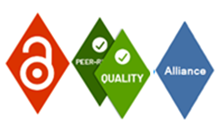Green Startups and Economic Development in India
DOI:
https://doi.org/10.53724/ambition/v8n1.03%20Keywords:
Green Startups, Organic farming, Economic DevelopmentAbstract
The vast population of India depends on agricultural activities for various purposes which include the contribution of the agricultural sector in the GDP of the country, providing food to the population, generating revenue for the government, generation of employment, etc. An organic farming method used by the agricultural sector is revolutionized by the green start-ups which help in the economic development of India through the path of sustainable development. The government's intention and initiative to promote start-ups in India have helped in creating jobs, improving the standard of living, and the overall development of the nation. Green start-ups are being prioritized by the population who is related to agricultural work. The paper primarily focuses on the research work done to study the need and growth of green start-ups in India. The paper also focuses on the economic factors that are influenced by the growing green start-ups in India.
References
Green Entrepreneurship In Rural Areas Todirica, Ioana Claudia. International Multidisciplinary Scientific Geo Conference SGEM; Sofia, Vol. 18, Iss. 5.3, (2018). DOI:10.5593/sgem2018/5.3/S28.055
Allen, J. C., & Malin, S. (2008). Green entrepreneurship: A method for managing natural resources? Society and Natural Resources, 21(9), 828–844. Berle, G. (1993). The green entrepreneur: Business opportunities that can save the earth and make you money. New York: Liberty Hall Press.
Chen, Y. S., Lai, S. B., & Wen, C. T. (2006). The influence of green innovation performance on corporate advantage in Taiwan. Journal of Business Ethics, 67(4), 331–339. 334 11 Green Entrepreneurship
Farinelli, F., Bottini, M., Akkoyunlu, S., & Aerni, P. (2011). Green entrepreneurship: The missing link towards a greener economy. Atdf Journal 8(3/4), 42–48.
Gibbs, D. (2009). Sustainability entrepreneurs, ecopreneurs and the development of a sustainable economy. Sheffield: Greenleaf Publishing Ltd.
Green Institute. (2018). The Green Campus Initiative (GCI). Nigeria. Retrieved April 9, 2018, from http://www.greeninstitute.ng/research-programs/the-green-campus-initiative/.
Hall, B. H., & Rosenberg, N. (2010). Handbook of the economics of innovation. Amsterdam: North Holland.
Hawken, M. (January 7, 2015). 7 Young African women entrepreneurs drive a new eco-spirit on the continent. Lionesses of Africa. Retrieved April 9, 2018, from http://www.lionessesofafrica. com/blog/2015/1/6/7-young-african-women-entre-preneurs-drive-a-new-eco-spirit-on-thecontinent/.
Holt, D. (2011). Where are they now? Tracking the longitudinal evolution of environmental businesses from the 1990s. Business Strategy and the Environment, 20(4), 238–250.
Jones, G. (2017). Profits and sustainability: A history of green entrepreneurship. Oxford: Oxford University Press.
Koester, E. (2016). Green entrepreneur handbook: The guide to building and growing a green and clean business. Boca Raton: CRC Press.
Njeru, E., Grey, S., & Kilawe, E. (2016). Eastern Africa Climate-Smart Agriculture Scoping Study: Ethiopia, Kenya and Uganda. Addis Ababa: Food and Agriculture Organization.
Parry, S. (2012). Going green: The evolution of micro-business environmental practices. Business Ethics: A European Review, 21(2), 220–237.
Pogutz, S., & Martín-Tapia, I. (2017). Let the Environment Guide Our Development, by J. Rockström, TED Global. Retrieved April 9, 2018, from http://www.ted.com/talks/johan_rockstrom_ let_the_environment_guide_our_development?
Adma, O. (2021). The Role of Environmental-Based “Green Startup” in Reducing Waste Problem and its Implication to Environmental Resilience. Research Horizon, 1(3), 106–114. https://doi.org/10.54518/rh.1.3.2021.106-114
Downloads
Published
How to Cite
Issue
Section
License

This work is licensed under a Creative Commons Attribution-NonCommercial 4.0 International License.
















